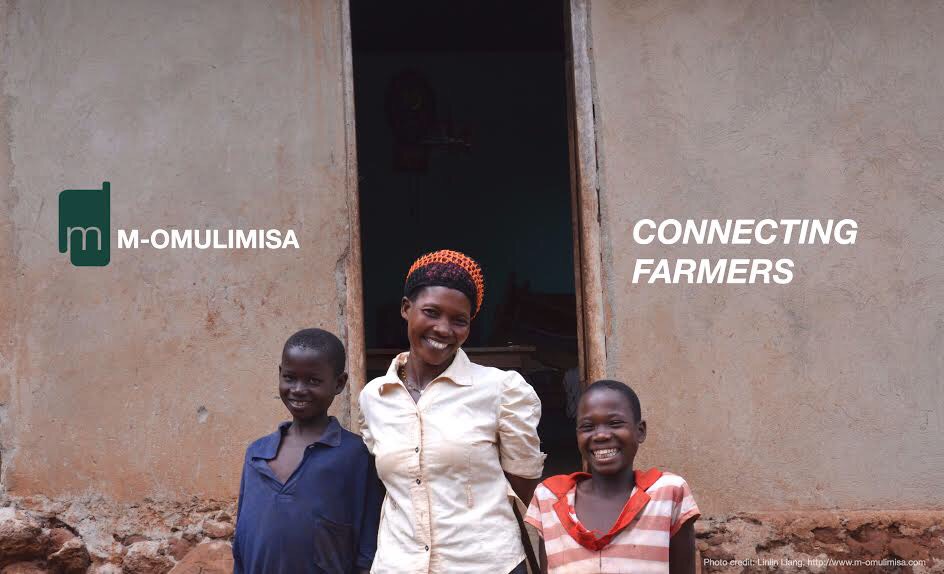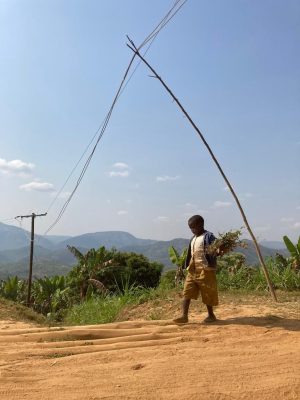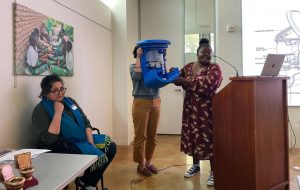By Francesca Munsayac and April Young
In rural Uganda, extension services help farmers apply cutting edge technologies and best practices that promote agricultural productivity and improve rural livelihoods. While most African countries have extension programs that arm local farmers with the agricultural information they need to succeed, limited resources often prevent extension workers from visiting more remote areas. Furthermore, the vast majority of technological solutions for agriculture are only offered English, limiting the reach of other IT innovations. To address this challenge, Big Ideas Contest winners, Linlin Liang and Daniel Ninsiima, developed “m-Omulimisa”, a phone-based platform that increases access to extension services for rural Ugandan farmers by providing critical agricultural information via SMS messaging in a local language. Through m-Omulimisa, any farmer in Uganda, regardless of location, can ask agricultural questions in any language via text message, and receive answers from a trained extension officer.
According to Liang, m-Omulimisa, which means “mobile extension officer” in native Luganda, bridges the access and information gap left behind by existing agricultural extension programs. The m-Omulimisa team teaches extension officers how to use the platform, and in turn, these officers train farmers how to submit their questions. The platform currently has over 100 registered extension officers and is being used by nonprofit organizations like World Vision, Sasakawa Global 2000, VEDCO, as well as local district governments, to reach underserved farmers.
“Our product utilizes SMS services as a vehicle to communicate between officers and farmers. We made our decision to use text messaging based on what was available and affordable for farmers. Over 65% of Ugandans own mobile phones, and most of these are basic phones which can be used only for calls and text messaging. Only about 5% of Ugandans own smartphones. Additionally, the cost of text messaging in Uganda is a fraction of the cost of calling or data for the Internet. ” Liang said.
While developing their platform, the team confronted various challenges, including mobile illiteracy in rural areas, lack of motivation on behalf of the officers to answer the farmer’s questions, and limitations in the last-mile distribution of agricultural inputs.
The team tackled the issue of mobile illiteracy by working with extensions services partners to integrate mobile phone literacy into every aspect of farmer training and, in the future, they plan on developing videos in local languages that will instruct users on the basic functions of a mobile phone. Next, they will create a reward system that incentivizes and increases extension officer engagement. Lastly, they plan on building a network of community based “agripreneurs” (agricultural entrepreneurs) that will help farmers get access to products by increasing distribution channels in rural communities.
When asked how Big Ideas contest helped the team translate their ideas into further action, Liang responded, “Before the contest, all we had were ideas, but no resources to change our ideas into action. The Big Ideas award made it possible for us to use our education, passion, and skills to start creating a tangible product to make a positive impact in the lives of smallholder farmers in Uganda. Even during the proposal stage, the training and mentorship from Big Ideas were phenomenal. We had a great mentor, Sean Krepp, who was connected through Big Ideas and helped us to rethink and reimagine the business model, partnership strategy, and product development. His guidance was vital in developing our winning proposal and starting a promising social enterprise.”
When asked if they had any advice for future students participating in Big Ideas, the m-Omulimisa team suggested the following:
(1) Identify the unique positioning of your product or service and how it adds value to prospective partners. In their case, many organizations are already providing agricultural extension services through the traditional face-to-face (in-person) approach, but there are not enough extension officers to serve every farmer. Their platform makes it possible to help more farmers in a timely manner at minimal cost.
(2) Human capital is critical in the early stages of developing your innovation. It is very helpful to have a team member who has extensive connections or experience with stakeholders in the industry or field where operations are taking place. Exploring potential partnerships with other existing products and services is also significantly helpful.
(3) Communicate with your team as regularly as possible. Fluid internal communication is a critical prerequisite for early-stage decision-making. If you are working with team members overseas, take advantage of both formal and informal communication tools (e.g., emails and Facebook).
Liang and Ninsiima are currently in the registration process of becoming a social enterprise. According to Liang, they will continue refining their business model to better reach underserved communities. In addition, they are looking to partner with university-based and agricultural researchers in order to build a coalition of experts who can respond to farmer’s questions. With this support, m-Omulimisa believes farmers will become vital actors in the movement to alleviate hunger and poverty in the developing world.





